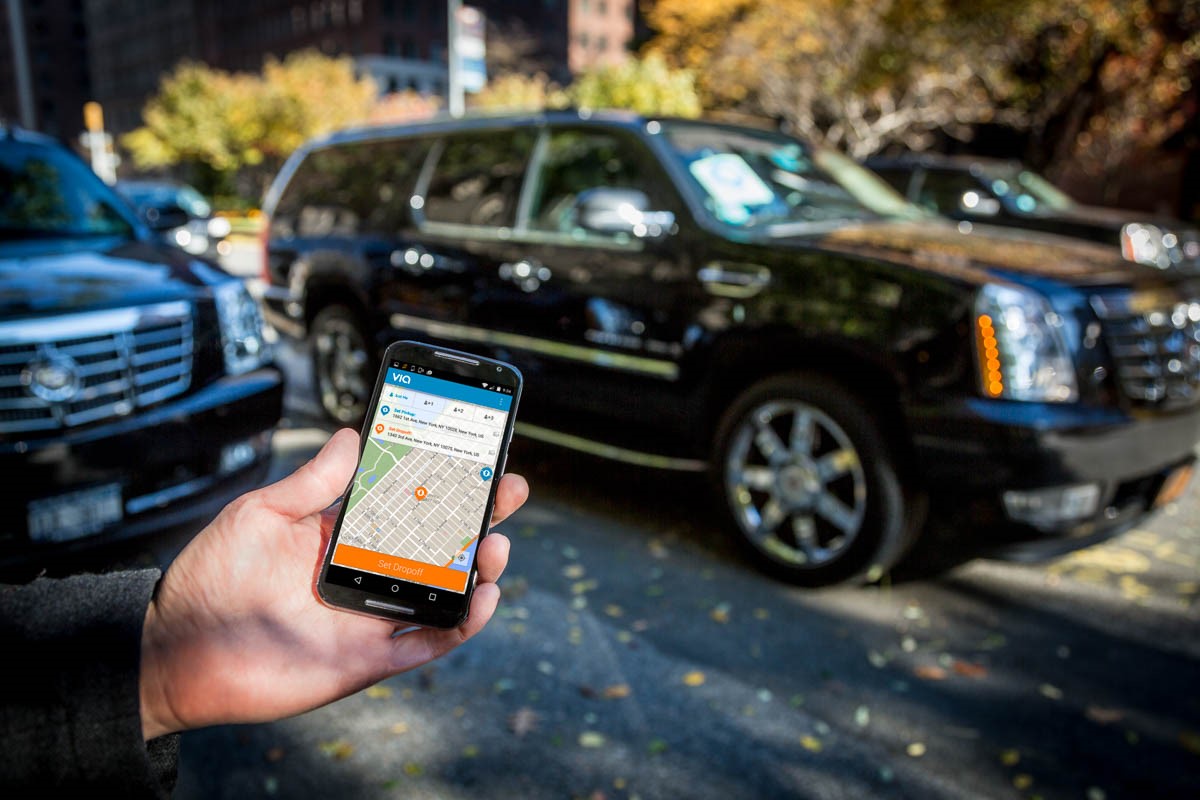Via raises $250M led by Daimler to bring its carpooling technology to Europe

As outsized ridesharing companies like Uber and Lyft continue to build out their taxi-style marketplaces largely based around connecting individual passengers to individual drivers, a startup focused squarely on the carpooling opportunity has raised a large round of funding to expand outside of the U.S.
Via — which has developed a shuttle-based carpooling service that it offers directly in the U.S. for a flat-rate starting at $5, as well as through platform partnerships with other transportation providers — has raised what it is describing as a “strategic investment” led by German automaker Daimler to expand into Europe as well as to work more closely on other business opportunities together. Alongside this, Daimler’s Mercedes Benz division is investing $50 million into a joint venture with the startup. The full amount of funding has not been disclosed, but we understand from a source very close to the deal that it is $250 million.
The sizeable funding underscores ongoing momentum in the transportation industry to build more tech-based solutions, updating outmoded legacy infrastructure with more efficient services that can meet the new demand for on-demand. Services like Uber’s gaining ground as one alternative to car ownership, but they are also eating into the business of mass-transit services at the same time.
Carpooling — where people come together in small groups to ride in the same general direction in a single car — is something that the Ubers of the world are also offering, but it also presents a window of opportunity to mass transit companies to better compete against those Ubers of the world.
“What you’ve seen in the last few years is that the solution for on-demand shuttles has gained a lot of momentum,” CTO and co-founder Oren Shoval told TechCrunch in an interview. “A lot of local stakeholders have licensed our platform.”
Other investors are not being revealed at this stage — Daimler is having a signing ceremony today to commemorate its specific involvement — but backers in this round include some of the company’s previous investors. Before this round, Via had raised $137 million with investors including 83North, C4 Ventures, Ervington Investments, Expansion Venture Capital, Hearst Ventures, Kapor Capital, Lior Prosor, Pitango, Planven, Poalim and RiverPark. Pitango had led Via’s previous two rounds, a $100 million Series C and a $27 million Series B.
The valuation is also not being disclosed, but a source tells us that it is a ‘definite upround.’ According to market analytics firm Zirra, the pre-money valuation for Via was between $450 million and $500 million. Based on that, at a rough estimate, that would put the valuation for Via now at $750 million.
Shoval said that the investment will see Via expanding its own-branded operations in Europe, initially in London, with Paris soon to follow. Via is also going to come to more markets in the U.S.: today, it’s live in New York, Chicago, and Washington DC and says it’s providing over 1 million rides per month, but it has also run smaller programs in Austin, TX and Orange County, CA, so those regions could be two likely targets for further expansion.
What’s interesting about Via is that while it is building its direct to consumer, own-brand operations, it also has been inking licensing deals with third parties that are already established in various places. These include partnerships with Arriva and Keolis, two mass-transit companies that operate city buses, train services and more in multiple counties. (Arriva is part of Germany’s Deutsche Bahn and Keolis’ parent is SNCF of France.)
Arriva and Keolis are licensing Via’s operating system to build their own carpooling trials. “This is an example how we use our tech to let companies transition to dynamic, real time solutions,” said Shoval. “It’s much more efficient to offer dynamic solutions using smaller vehicles instead of large busses.” He added that there is also potential to use Via’s platform to help direct traffic for other vehicles they operate.
Shoval said that the Daimler deal getting announced today will encompass investments and partnerships to expand these two existing business lines, and more.
Via has been in partnership with Daimler for years already, including working on the pilot in Orange County using Mercedez Benz vehicles.
The opportunity for Daimler in this investment covers are few different areas. One is that it gives Daimler a bigger sales funnel in providing vehicles for such services. In particular, a Via partnership can help in their own R&D and design work for new vehicles optimised for carpooling and other on-demand transportation. “One big question [for the future of transportation] is, ‘what is the right vehicle?’” Shoval said. “There are the seating arrangements, how you connect the sensors, what kind of door it should have. This is a big piece of mobility.”
It will also give Daimler an opportunity to embed technology and sensors in those vehicles that can make other ridesharing services more efficient. “We also believe that the vehicles in the network, at the end of the day, it’s not just an app but a whole service that you are getting. It makes sense to have these things converge,” said Shoval.
Lastly, it gives Daimler a chance to get behind the wheel (so to speak) of the transportation service itself, thus developing a business around recurring service revenues.
Daimler is not a stranger to that part of the business. The company has made a number of investments and acquisitions in the last several years around transportation technology and also transportation services themselves. They include an owning stake in Here, the mapping business; investments in Careem and car-tech services like Momenta; and the acquisition of myTaxi and the many operations that now form a part of that like Hailo and TaxiBeat.
“On-demand ride-sharing offers many new ways of making city traffic efficient, needs-based and sustainable – especially when it involves the use of spacious, safe and comfortable vans,” says Volker Mornhinweg, Head of Mercedes-Benz Vans, in a statement. “Via is one of the most successful providers in the growing ride-sharing sector while Mercedes-Benz Vans has the perfect vehicles that are being continuously optimized for this job. By deepening our cooperation with Via, we are thus taking the next logical step in the context of our strategy for the future and are expanding our range of new mobility services.”
Published at Mon, 04 Sep 2017 12:00:43 +0000





